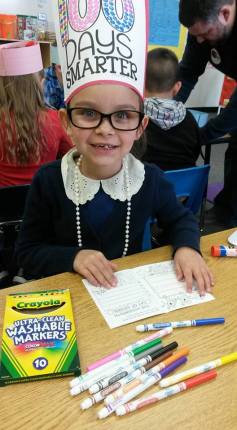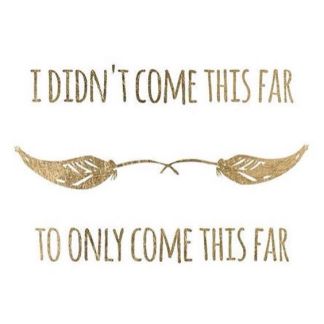
This post is in response to a brief blog-versation I had with the charming Brian over at Bonnywood Manor after he kindly nominated me for a Liebster Award. Liebster means “favorite” in German and the nomination carries along with it some obligations, which I am politely, humbly, and gratefully ignoring. Brian was curious about my creative process and the critique group to which I belong. Therefore, instead of accepting the award, I wrote this. If you have something to say about writing, creativity, or lifelong learning, please do so in the comments. I’d love to hear your thoughts. XO
In this photo, my granddaughter is celebrating her 100th day of kindergarten and being “100 DAYS SMARTER.” It got me thinking, shouldn’t we all celebrate getting smarter? Am I still learning?
I like to think so, but some of that learning is accidental. For example, perhaps we should have gotten an estimate to replace the roof on this twenty-year-old house before we made our offer. Or maybe drinking several cups of tea with my sushi at dinner the other night wasn’t such a good idea. I guess that’s what they mean by “live and learn.”
Other times, however, I’ve set out to learn a new skill. On purpose. I’ve put myself in the uncomfortable situation of being potentially and embarrassingly bad at something. Like blogging. Or yoga. In short, I’ve risked failure. At my age, being new at anything is refreshing—scary and humbling–but refreshing. Even exhilarating.
Case in point, at the urging of my friend, Joan, I wrote a “novel” in 2009 during NaNoWriMo. The quotes are because my “novel” was merely 70,000 words of collected scenes and sketches, held together with hope, Dove wrappers, and sticky notes. It added up to a word count, but little else. I knew I needed help massaging it into something meaningful (readable even?), but what kind of help? How much? And who do I ask?
Enter another friend, Marilee, who just happened to be a legendary writing instructor at Western Nevada College and founder of Lone Mountain Writers, a local critique group. LMW has been meeting every other week for over twenty years and has among its past and present members several published poets and authors such as romance writer, Wilma Counts. Marilee invited me to join. I accepted.
During my first few meetings, I observed the protocol and learned the ground rules. Up to four pieces are emailed to the group ahead of time so we have a chance to read deeply and make notes. Submissions can be up to fifteen pages. The group responds round-robin style with each of our oral comments limited to two or three minutes, all while the author remains stoically silent. We hand over our marked up copy to the author who only at the end may ask questions, defend, or clarify something.
I was profoundly impressed by the variety and quality of writing. Many people were working on novels. And for the most part, they didn’t need help with grammar or punctuation. The discussions focused on elements of fiction: plot, point of view, character, structure, pacing, voice, etc. These are the things a reader may not even notice, except in their absence. It’s what makes a reader want to invest time and thought and heart in the work. That stuff.
Consequently, I waited months before I worked up the courage to submit. I’d been writing personal narratives and opinions for years, but fiction was new to me. I polished my first chapters until (I thought) they sparkled. I just knew the group would be blown away by my literary genius. Instead, what I heard–repeatedly–was, “This is excellent writing, but you don’t have a story here.” Apparently, what I had was a mess of good writing.

But the story in my head kept pushing me forward. It wouldn’t let me give up.
So I kept listening and learning. I read books on writing and revising. I rewrote and resubmitted. I attended a local writers conference and got feedback from a real, live editor. I “killed my darlings,” deleting lovely little bits of writing that didn’t serve my story. I learned not to take any critique personally and to listen to those who shared my vision for my story. I smiled and respectfully set aside advice from those who wanted my story to become theirs. (It needs more explosions! How about some robots?)
Now, five years and countless drafts and revisions later, what I hear is, “This is the best thing you’ve submitted,” and “I finally like this character. I understand her now.” Whew.
So while I may not have a cute hat to wear to celebrate getting smarter, I nonetheless feel a sense of accomplishment. That’s enough to keep me going. Good thing, because it’s not done yet. But neither am I. I’ve invested too much time and energy to quit now. I’m smart enough to know that.
Great post! And wonderful insight. You are a wise and talented woman with the ability to use pictures to get your point across, too! Brilliant! #amwriting
LikeLiked by 1 person
Tha, Joan, for responding and for making me do that damned NaNo in the first place. LMW may feel differently, however. XO
LikeLike
**Thanks.
LikeLike
How fantastic that you found a writer’s group that was helpful, and that you stuck with it despite the initial disappointment! I feel challenged by your tale — I wrote a novel and allowed exactly four people to read it. Three were related to me, the other was a good friend.
I find your courage inspiring!
LikeLiked by 1 person
I think it is critical that there were and are wonderful English instructors in the group, not just folks who’ve written something. My one friend (outside the group) who read it, LOVED it. No pointers, no edits. Nice, but not helpful. In group, we learned to think deeply and critically. In addition, it was enlightening to discover that even though we are all read the same things, none of read the same thing. We each brought our own experiences and biases to the act of reading. There are some online critique groups. Maybe the NaNoWriMo site can point you in the right direction. Good luck and thanks for stopping by.
LikeLike
And then there were last night’s chapters. Oops. It seems I may have gotten a little cocky, but the group pointed the way to more rewrites.
LikeLike